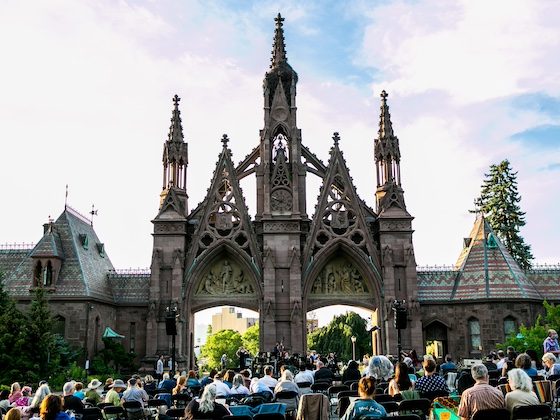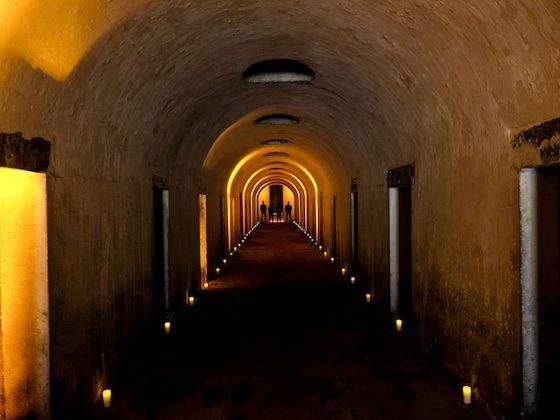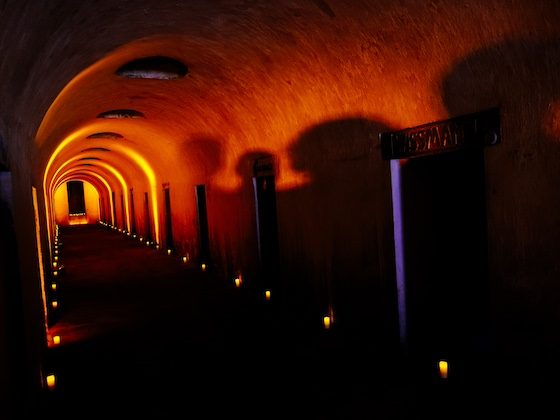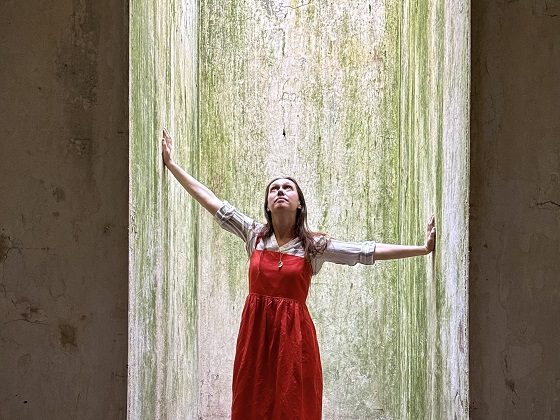Liszt: Poetic and Religious Harmonies
Almost no one plays the complete Poetic and Religious Harmonies by Franz Liszt. Between the sheer finger-bending virtuosity, emotionally-draining intensity, and epic length, each of the ten movements stands as its very own musical monolith. But when experienced all together, the cycle gains an almost mystical transcendence, a spiritual journey from the opening “Invocation,” the meditative glow of “The Blessing of God in Solitude,” the anguish of “Funeral,” and the quiet rapture of “Hymn of Love.” It’s a lot for one pianist to take on, and that’s why we’ve got two of ‘em: keyboard stars Adam Tendler and Jenny Lin, both bringing their unique talents and vision to their respective half of the piece.
Liszt: Poetic and Religious Harmonies
Almost no one plays the complete Poetic and Religious Harmonies by Franz Liszt. Between the sheer finger-bending virtuosity, emotionally-draining intensity, and epic length, each of the ten movements stands as its very own musical monolith. But when experienced all together, the cycle gains an almost mystical transcendence, a spiritual journey from the opening “Invocation,” the meditative glow of “The Blessing of God in Solitude,” the anguish of “Funeral,” and the quiet rapture of “Hymn of Love.” It’s a lot for one pianist to take on, and that’s why we’ve got two of ‘em: keyboard stars Adam Tendler and Jenny Lin, both bringing their unique talents and vision to their respective half of the piece.
Liszt: Poetic and Religious Harmonies
Almost no one plays the complete Poetic and Religious Harmonies by Franz Liszt. Between the sheer finger-bending virtuosity, emotionally-draining intensity, and epic length, each of the ten movements stands as its very own musical monolith. But when experienced all together, the cycle gains an almost mystical transcendence, a spiritual journey from the opening “Invocation,” the meditative glow of “The Blessing of God in Solitude,” the anguish of “Funeral,” and the quiet rapture of “Hymn of Love.” It’s a lot for one pianist to take on, and that’s why we’ve got two of ‘em: keyboard stars Adam Tendler and Jenny Lin, both bringing their unique talents and vision to their respective half of the piece.
Liszt: Poetic and Religious Harmonies
Almost no one plays the complete Poetic and Religious Harmonies by Franz Liszt. Between the sheer finger-bending virtuosity, emotionally-draining intensity, and epic length, each of the ten movements stands as its very own musical monolith. But when experienced all together, the cycle gains an almost mystical transcendence, a spiritual journey from the opening “Invocation,” the meditative glow of “The Blessing of God in Solitude,” the anguish of “Funeral,” and the quiet rapture of “Hymn of Love.” It’s a lot for one pianist to take on, and that’s why we’ve got two of ‘em: keyboard stars Adam Tendler and Jenny Lin, both bringing their unique talents and vision to their respective half of the piece.
Pergolesi: Stabat Mater
The Stabat Mater is a medieval poem that describes the suffering of Jesus’s mother Mary as she stands at the foot of the cross. Pergolesi’s setting of the text is among the most haunting and gut wrenching compositions ever put to paper. At one point, the piece asks us if it’s possible to watch someone else suffer so deeply, and not somehow share in their sorrow. It stands as one of the purest musical depictions of empathy, and a powerful reminder that - no matter what pain we may feel in the moment - we’re never truly alone in our sadness. Performed by the String Orchestra of Brooklyn, the program will also feature Barber’s wrenching Adagio for Strings, and Arvo Pärt’s slow-burning Fratres, and if that all wasn’t enough - the entire performance will feature wall-to-ceiling film projections up and down the catacombs, from the masters Ricardo Romaneiro and Mau.
Pergolesi: Stabat Mater
The Stabat Mater is a medieval poem that describes the suffering of Jesus’s mother Mary as she stands at the foot of the cross. Pergolesi’s setting of the text is among the most haunting and gut wrenching compositions ever put to paper. At one point, the piece asks us if it’s possible to watch someone else suffer so deeply, and not somehow share in their sorrow. It stands as one of the purest musical depictions of empathy, and a powerful reminder that - no matter what pain we may feel in the moment - we’re never truly alone in our sadness. Performed by the String Orchestra of Brooklyn, the program will also feature Barber’s wrenching Adagio for Strings, and Arvo Pärt’s slow-burning Fratres, and if that all wasn’t enough - the entire performance will feature wall-to-ceiling film projections up and down the catacombs, from the masters Ricardo Romaneiro and Mau.
Pergolesi: Stabat Mater
The Stabat Mater is a medieval poem that describes the suffering of Jesus’s mother Mary as she stands at the foot of the cross. Pergolesi’s setting of the text is among the most haunting and gut wrenching compositions ever put to paper. At one point, the piece asks us if it’s possible to watch someone else suffer so deeply, and not somehow share in their sorrow. It stands as one of the purest musical depictions of empathy, and a powerful reminder that - no matter what pain we may feel in the moment - we’re never truly alone in our sadness. Performed by the String Orchestra of Brooklyn, the program will also feature Barber’s wrenching Adagio for Strings, and Arvo Pärt’s slow-burning Fratres, and if that all wasn’t enough - the entire performance will feature wall-to-ceiling film projections up and down the catacombs, from the masters Ricardo Romaneiro and Mau.
Angel’s Share: Spring, Strings, and Tasty Things
After three years of alliterative magnificence, beginning with the legendary Burgers, Bourbon & Beethoven Festival, we've decided that we should stop limiting ourselves to just one choice of food, drink, and musical repertoire. This year, we open our hearts, minds, and gullets, to take in a smorgasbord of sounds, sips, and sumptuous victuals.
Angel’s Share: Beethoven’s String Quartet No. 15, Op. 132
Beethoven's final String Quartet is an indescribably powerful, transcendently life-affirming masterpiece. Its movements are centered around the towering slow section, which Beethoven wrote after recovering from a terrible illness, solemnly titling it a “Hymn of thanks to God from one who is healed.” In times of despair and division, the beauty of this music remains a balm to the soul, and a reminder of how we can find strength in our darkest moments.
Angel’s Share: Beethoven’s String Quartet No. 15, Op. 132
Beethoven's final String Quartet is an indescribably powerful, transcendently life-affirming masterpiece. Its movements are centered around the towering slow section, which Beethoven wrote after recovering from a terrible illness, solemnly titling it a “Hymn of thanks to God from one who is healed.” In times of despair and division, the beauty of this music remains a balm to the soul, and a reminder of how we can find strength in our darkest moments.
Angel’s Share: Beethoven’s String Quartet No. 15, Op. 132
Beethoven's final String Quartet is an indescribably powerful, transcendently life-affirming masterpiece. Its movements are centered around the towering slow section, which Beethoven wrote after recovering from a terrible illness, solemnly titling it a “Hymn of thanks to God from one who is healed.” In times of despair and division, the beauty of this music remains a balm to the soul, and a reminder of how we can find strength in our darkest moments.
Angel’s Share: Beethoven’s String Quartet No. 15, Op. 132
Beethoven's final String Quartet is an indescribably powerful, transcendently life-affirming masterpiece. Its movements are centered around the towering slow section, which Beethoven wrote after recovering from a terrible illness, solemnly titling it a “Hymn of thanks to God from one who is healed.” In times of despair and division, the beauty of this music remains a balm to the soul, and a reminder of how we can find strength in our darkest moments.
Angel’s Share: Beethoven’s String Quartet No. 15, Op. 132
Beethoven's final String Quartet is an indescribably powerful, transcendently life-affirming masterpiece. Its movements are centered around the towering slow section, which Beethoven wrote after recovering from a terrible illness, solemnly titling it a “Hymn of thanks to God from one who is healed.” In times of despair and division, the beauty of this music remains a balm to the soul, and a reminder of how we can find strength in our darkest moments.
Angel’s Share: Beethoven’s String Quartet No. 15, Op. 132
Beethoven's final String Quartet is an indescribably powerful, transcendently life-affirming masterpiece. Its movements are centered around the towering slow section, which Beethoven wrote after recovering from a terrible illness, solemnly titling it a “Hymn of thanks to God from one who is healed.” In times of despair and division, the beauty of this music remains a balm to the soul, and a reminder of how we can find strength in our darkest moments.
Angel’s Share: Caroline Shaw’s Partita
Caroline Shaw's Pulitzer Prize-winning Partita for 8 Voices is a work of profound emotional beauty, a timeless expression that feels at home in any musical era. For these performances, the groundbreaking vocal talents of Fourth Wall Ensemble will weave together a program that begins with improvised medieval chant, flowing seamlessly through the Renaissance and Baroque periods, before arriving at Shaw's staggering sonic suite.
Angel’s Share: Caroline Shaw’s Partita
Caroline Shaw's Pulitzer Prize-winning Partita for 8 Voices is a work of profound emotional beauty, a timeless expression that feels at home in any musical era. For these performances, the groundbreaking vocal talents of Fourth Wall Ensemble will weave together a program that begins with improvised medieval chant, flowing seamlessly through the Renaissance and Baroque periods, before arriving at Shaw's staggering sonic suite.
Angel’s Share: Caroline Shaw’s Partita
Caroline Shaw's Pulitzer Prize-winning Partita for 8 Voices is a work of profound emotional beauty, a timeless expression that feels at home in any musical era. For these performances, the groundbreaking vocal talents of Fourth Wall Ensemble will weave together a program that begins with improvised medieval chant, flowing seamlessly through the Renaissance and Baroque periods, before arriving at Shaw's staggering sonic suite.
Angel’s Share: mɔɹnɪŋ [morning//mourning]
mɔɹnɪŋ (the phonetic spelling for the word "morning" as well as the word "mourning") is an operatic masterpiece by singer and composer Gelsey Bell, which begins just after humanity has disappeared entirely from the Earth, and traces the weeks, months, years, and millennia that follow. What emerges is a journey through time that is simultaneously whimsical, fantastical, playful and profound, offering a poignant reminder of what it means to be human – despite taking place entirely after our species has vanished from the planet. This specially-adapted production of this critically-acclaimed opera was created just for the Catacombs.
Angel’s Share: mɔɹnɪŋ [morning//mourning]
mɔɹnɪŋ (the phonetic spelling for the word "morning" as well as the word "mourning") is an operatic masterpiece by singer and composer Gelsey Bell, which begins just after humanity has disappeared entirely from the Earth, and traces the weeks, months, years, and millennia that follow. What emerges is a journey through time that is simultaneously whimsical, fantastical, playful and profound, offering a poignant reminder of what it means to be human – despite taking place entirely after our species has vanished from the planet. This specially-adapted production of this critically-acclaimed opera was created just for the Catacombs.
Angel’s Share: mɔɹnɪŋ [morning//mourning]
mɔɹnɪŋ (the phonetic spelling for the word "morning" as well as the word "mourning") is an operatic masterpiece by singer and composer Gelsey Bell, which begins just after humanity has disappeared entirely from the Earth, and traces the weeks, months, years, and millennia that follow. What emerges is a journey through time that is simultaneously whimsical, fantastical, playful and profound, offering a poignant reminder of what it means to be human – despite taking place entirely after our species has vanished from the planet. This specially-adapted production of this critically-acclaimed opera was created just for the Catacombs.
Angel’s Share: mɔɹnɪŋ [morning//mourning]
mɔɹnɪŋ (the phonetic spelling for the word "morning" as well as the word "mourning") is an operatic masterpiece by singer and composer Gelsey Bell, which begins just after humanity has disappeared entirely from the Earth, and traces the weeks, months, years, and millennia that follow. What emerges is a journey through time that is simultaneously whimsical, fantastical, playful and profound, offering a poignant reminder of what it means to be human – despite taking place entirely after our species has vanished from the planet. This specially-adapted production of this critically-acclaimed opera was created just for the Catacombs.
Angel’s Share: mɔɹnɪŋ [morning//mourning]
mɔɹnɪŋ (the phonetic spelling for the word "morning" as well as the word "mourning") is an operatic masterpiece by singer and composer Gelsey Bell, which begins just after humanity has disappeared entirely from the Earth, and traces the weeks, months, years, and millennia that follow. What emerges is a journey through time that is simultaneously whimsical, fantastical, playful and profound, offering a poignant reminder of what it means to be human – despite taking place entirely after our species has vanished from the planet. This specially-adapted production of this critically-acclaimed opera was created just for the Catacombs.
Angel’s Share: mɔɹnɪŋ [morning//mourning]
mɔɹnɪŋ (the phonetic spelling for the word "morning" as well as the word "mourning") is an operatic masterpiece by singer and composer Gelsey Bell, which begins just after humanity has disappeared entirely from the Earth, and traces the weeks, months, years, and millennia that follow. What emerges is a journey through time that is simultaneously whimsical, fantastical, playful and profound, offering a poignant reminder of what it means to be human – despite taking place entirely after our species has vanished from the planet. This specially-adapted production of this critically-acclaimed opera was created just for the Catacombs.
Green-Wood’s public programs are made possible by the New York State Council on the Arts with the support of the Office of the Governor and the New York State Legislature, as well as the New York City Department of Cultural Affairs.




